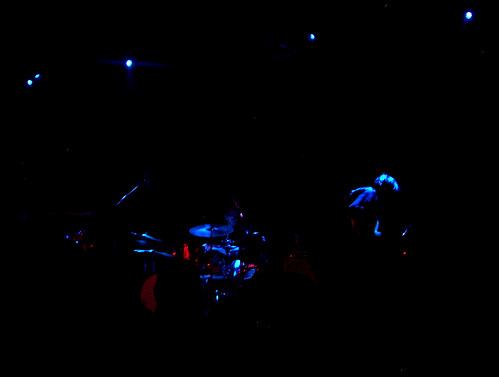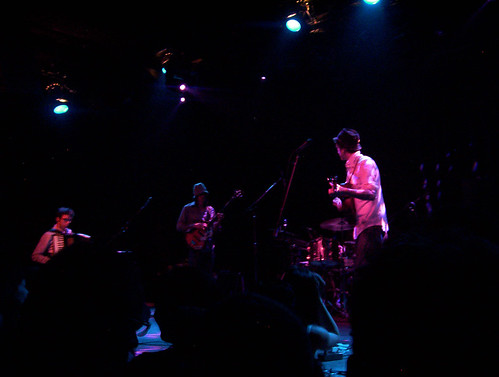I had the pleasure of attending the Community Next conference at Stanford this weekend. The following is my story.
(cue Law and Order orchestra hit)

Community Next was organized by the (in?)famous and high-energy Noah Kagen. Sadly, I didn’t get to chat with him for very long, but he graciously cleared up some registration problems (not their fault) quickly for me, so he gets points for that.
Squeezed into Stanford’s Annenberg Auditorium, Community Next was definitely underestimated. As I heard it, the waiting list was 3x the size of attendees…not a bad feat for a first-time conference.
After some cute “social networking” activities that didn’t quite catch on (finding the attendee with your “weird fact”, signing “Hello, my name is” shirts) and a generous collection of Noah’s Bagels, the varied group of Web2.0ers shuffled their way into the auditorium. This was defintely the right crowd for this conference: strangers meeting left and right, reluctant to move from the idea-riffing of the hallways into the confines of the presentations.
After the somewhat appropriate notes of The Who’s Baba O’Reilly (“The exodus is here/The happy ones are near/Let’s get together/Before we get much older”) faded out, Noah briefly introduced the conference (saying something about cheating girlfriends and the Amish) before giving the floor to Josh Spear and Aaron Dignan. As would become the standard, the two presenters ran down a quick list of their top rules and were shuffled offstage before they could go into much depth.
Highlights (paraphrased):
“Be authentic…your social networking site should be built by lovers.”
“Let community create you (integrate, don’t infiltrate)”.
Tara Hunt ran into the same time constraints, making it very obvious that this conference should have been two days long (and probably will be next year, if this year’s success was any indication).
Next was a very interesting panel discussing “creating, analyzing, and marketing your own online community” featuring Hiten Shah of Crazyegg, Matt Roche of Offermatica, Mike Jones of Userplane (who looks like Jason Statham in The Transporter but is actually less terrifying), and Joe Hurd of VideoEgg. A much more business-minded group than the semantic openers, the highlights of this discussion included the suggestion to build one user at a time…literally. MySpace and Friendster, one of the panelists pointed out, started adding their friends one by one. “I would see Tom on IM at 3 in the morning, plugging away”.
“Ask your users about advertising” was another theme (reiterated by Heather Luttrell of 3jam and indieclick later in the conference); they know you have to pay the bills, and they’d rather have input than have it sprung on them.
And one of the best quotes of the conference came from Matt Roche: “MySpace is a massive popularity contest…like digital binders covered in stickers.” So true. What does that make Facebook? A pretentious art student’s portfolio?
I won’t go much into his presentation, but Nikhyl Singhal of SayNow has an amazing product that links fans and artists by voice…they sent my band, Monsters are not Myths an invitation a few weeks back, and now I’m fully convinced.
Lunch was delicious Hawaiian BBQ and a significant amount of social networking. I felt really dumb not having any business cards yet (that’s definitely on the list for today). Oh well.

Things got much more exciting after lunch, as we were treated to the best presentation of the conference: “The patent-pending skinnyCorp method for creating online awesomeness and other cool stuff” by Jeffrey Kalmikoff and Jake Nickell of Threadless. These guys could go into stand up comedy if they weren’t making tons of money from Threadless, Naked & Angry, and Extra Tasty! But they weren’t just funny: they were right.
Jeffrey and Jake hammered in this major point:
“Your Project Is Not Good Enough”
No, they weren’t trying to get us down. Their point was that you are never “finished” with your product unless you’re shutting it down. They’ve started a number of projects because they wanted to use them (iparklikeanidiot.com being my favorite), and every time one of these projects became stupid/useless/uninteresting, they shut them down. The ones they didn’t shut down they continue to expand and enhance (and they’re making a lot of money from it).

Their four commandments (“We figured out that because we have four commandments, it means each of our commandments are 2 1/2 times more powerful than each of Moses’ Commandments”):
1. Allow your content to be created by it’s community
2. Put your project in the hands of it’s community (actually, not just pretending)
3. Let your community grow ITSELF
4. Reward the community that makes your project possible
I would have loved to chat with these two later, but they were swamped with questions. Truly the best work of the conference.
We were swung through a couple short presentations next: Heather Luttrel spoke about monetizing with ads (and not pissing off your audience), Fred Stutzman of claimid gave us some figures about social networks, and Jake Mckee emphasized how important even a small but evangelical percentage of your community can be.
Ted Rheingold, John Vars, and Steven Reading of Dogster (and Catster) went through a (slightly too long) discussion of how they started the two sites. It was very impressive, offering a few relevant points and one slightly painful statement: “I’m so sick of everything being beta”. Flock 1.0 is coming soon, I promise!

Lastly, we had an interesting panel moderated by the funny and incredibly intelligent Guy Kawasaki. Akash Garg of hi5, Sean Suhl of Suicide Girls, James Hong of HotOrNot, Markus Frind of PlentyOfFish, Max Levchin of Slide and Drew Curtis of Fark meditated on how they reached 5 million members. The answer was mainly: right place, right time, a concept they would enjoy, and a lot of experimentation. Also, the best quotes of the conference:
Curtis: “Basically, we’re a complete waste of time.”
Suhl: “I was working for a big sportswear manufacturer in Portland…”
Guy: “And you decided to ‘Just Do It’?”
Hong: “How HotOrNot started…I was drinking.”
Curtis: “Actually, I could have flipped a coin…and had a Curry Recipe Database instead of Fark.”
My conclusion: Community Next, while a bit rough around the edges, is definitely Hot. It’s great to see so much emphasis placed on community and so many minds thinking about it. Here’s hoping we see an expanded conference next year with more presenter time, more space, more organization, and more Hawaiian BBQ.
-Evan

Blogged with Flock
Tags: community, communitynext2007, CommunityNext, Evan Hamilton, Erwan Loisant, Tara Hunt, Baba O’Reilly, The Who, Noah Kagen, Aaron Dignan, Josh Spear, Crazyegg, Hiten Shah, Offermatica, Matt Roche, Userplane, Mike Jones, VideoEgg, Joe Hurd, Guy Kawasaki, Akash Garg, hi5, Sean Suhl, Suicidegirls, James Hong, hotornot, Markus Friend, plentyofish, Max Levchin, slide, Drew Curtis, fark, Heather Luttrel, Fred Stutzman, Jake Mckee









